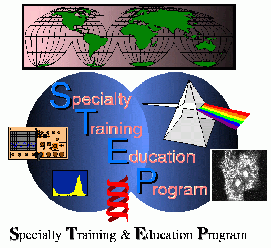


[Introduction to STEP]
[Specialty Areas]
[STEP Committee Members]
[Search for Keyword]
Plant Cell Studies
Immunophenotyping Non-human Systems
Production of Monoclonal & Polyclonal Antibodies
Cell and Hybridoma Facility Iowa State University 1104 Molecular Biology Ames, IA 50011Laboratory Profile
Head: Dr. Kristi R. Harkins
1. Facilities: We are located in a new building ('92) designed for molecular biology research with several core preparation and instrumentation spaces, a greenhouse, and an animal care facility. Our facility consists of a flow cytometry core lab, a hybridoma cell culture core lab, a wet lab preparation area, peripheral equipment space, and office area.
2. Instrumentation:
Flow cytometry: EPICS 752 with a Coherent 90-5 laser with ultraviolet optics and dye head, and a Profile I.
Other instrumentation: Olympus IMT-2 inverted microscope equipped with microinjection equipment, CRT and photographic equipment, Olympus Vanox fluorescence microscope, Titertek Fluoroscan II fluorescence 96-well plate reader, Biotek EL312e ELISA 96-well plate reader, and MACS magnetic separation system.
Computers/software: Flow cytometers are linked via ethernet to two HP computers which utilize the Coulter Elite software and Phoenix Multicycle software for off-line analysis. Additional graphics packages include Sigmaplot, Harvard Graphics, and Microsoft Publisher.
3. Specialization Areas: (I) Isolation and quantitative analysis of plant nuclei for cell cycle and genome size measurements, isolation and analysis of plant protoplasts for cell size, chlorophyll content, and viability. (II) Isolation and analysis of swine and bovine peripheral white blood cells for immunophenotyping. (III) Antibody production techniques involving animal immunization, cell fusion, cell culture, cloning, cryopreservation, ascites production, and animal handling.
4. Special Opportunities: Routine analyses performed include nuclei isolation and quantitation of plant genome size, and preparation and analysis of swine and bovine lymphocyte subsets from peripheral blood. We also utilize HL60 cells in apoptosis studies. We routinely culture, isolate, and prepare adherent and nonadherent cell lines for flow cytometric studies involving cell cycle analysis, viability, and/or the measurement of specific surface markers. Multiple monoclonal and polyclonal antibody production projects are in progress at any one time in the laboratory.
5. Special Courses Offered: One-day training workshops are offered in the summer on a variety of topics including: Apoptosis: Programmed Cell Death, Cell Cycle/Genome Size Analysis (Plant, Yeast, & Animal Systems), Production of Polyclonal Antibodies (Rabbit Model Systems), and T-Cell Subset Analysis: Swine and Bovine Systems.
6. Graduate Program: Three courses are offered for graduate students (1 credit each): Introduction to the Biotechnology Instrumentation Facilities (lecture only - 8 weeks). Introduction to Flow Cytometry Methods (lecture/lab - 5 weeks), Monoclonal Antibody Production Techniques (lecture/lab - 8 weeks). Flow cytometric techniques have played a major role in thesis work for several graduate students from various programs (Botany, Forestry, Zoology, Genetics, Veterinary Physiology Pharmacology, Animal Science, Microbiology, Immunology, and Preventive Medicine). Individualized training is available for graduate students whose research entails the use of a specific flow cytometric technique including lymphocyte phenotyping in swine/bovine, and plant genome size analyses.
7. Local Accommodations: Iowa State Memorial Union Guest Room (on campus, one block from lab) rate is $40/night (single) and local motels offer weekly rates which range from $100-$150 (1 to 2 miles from lab).
8. Transportation: The Des Moines International Airport (DSM) is located approximately 35 miles south of Ames. Shuttle service is available from DSM to Ames ($11 one-way) one time per day. Ames has an excellent bus system with monthly passes ($25) or $0.75 per ride.
9. Cost of Internships: One-day workshop fees are currently $30 per workshop. Individualized training sessions are negotiable depending upon the intensity and duration of the training session and the specific techniques to be covered.
10. Communications:
Kristi R. Harkins, Ph.D. Iowa State University Cell & Hybridoma Facility 1104 Molecular Biology Ames, IA 50011 Phone: (515) 294-2472 FAX: (515) 294-0453 E-mail: kharkins@iastate.edu
